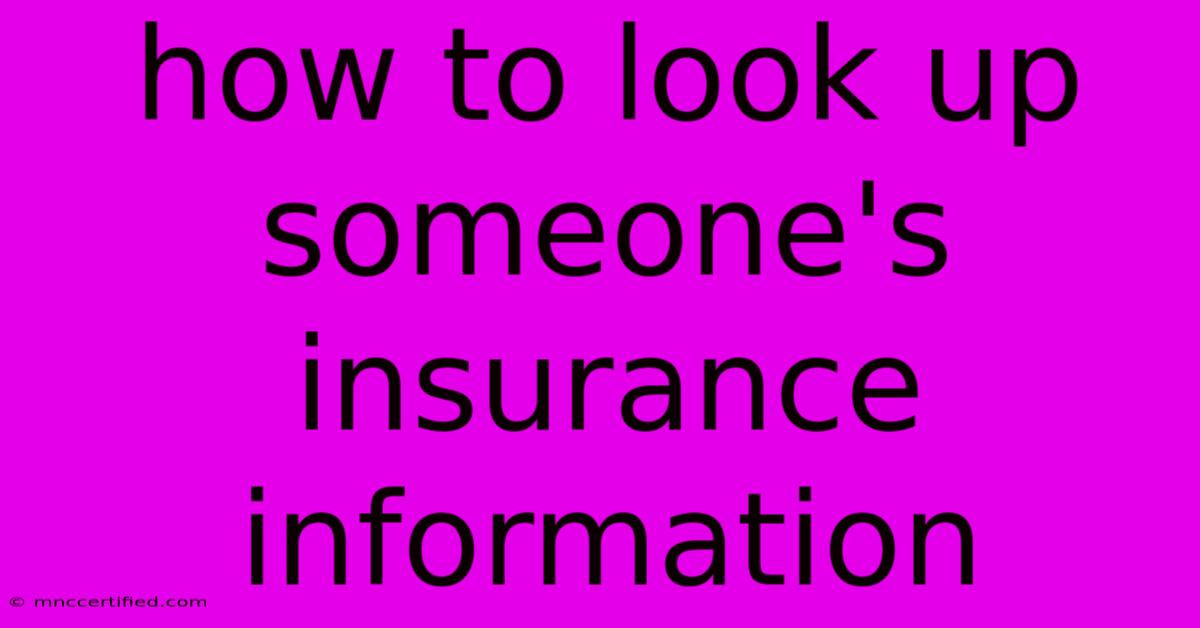How To Look Up Someone's Insurance Information

Table of Contents
How to Look Up Someone's Insurance Information: A Guide to Legitimate Methods
Looking up someone's insurance information without their consent is illegal and unethical. However, there are legitimate reasons and methods for accessing insurance information, especially when it involves yourself, a family member, or a business transaction. This guide outlines legal ways to obtain this information, while emphasizing the importance of respecting privacy and following legal guidelines.
Understanding Privacy Laws and Ethical Considerations
It's crucial to understand the legal framework surrounding accessing personal information, especially sensitive data like insurance details. In most jurisdictions, accessing someone's insurance information without their explicit consent is a violation of privacy laws and can result in serious consequences, including fines and even jail time.
Legitimate Reasons for Accessing Insurance Information
There are legitimate reasons why you might need to look up someone's insurance information. These include:
- Medical Emergencies: If you are involved in an accident with someone and they require immediate medical attention, you may need to access their insurance information to ensure they receive the necessary care.
- Insurance Claims: If you are involved in a car accident or other incident that requires an insurance claim, you will need to provide your insurance information to the other party.
- Business Transactions: Certain business transactions, such as renting a car or purchasing a home, may require you to provide your insurance information.
Legal Ways to Look Up Someone's Insurance Information
1. Direct Request: The most ethical and legal way to obtain someone's insurance information is to ask them directly. Be polite and explain why you need the information.
2. Insurance Provider: If you have a legitimate reason to access someone's insurance information, you can contact their insurance provider. They will likely require you to provide documentation confirming your reason for the request.
3. Legal Subpoena: In some cases, a court may issue a subpoena requiring an insurance provider to release information. This is usually only used in legal proceedings.
4. State-Mandated Databases: Some states have databases that allow access to insurance information for specific purposes, such as verifying insurance coverage for drivers.
5. Public Records: While limited, certain public records may contain insurance information, depending on the jurisdiction. However, accessing these records often requires specific reasons and procedures.
Importance of Respecting Privacy
It's essential to remember that personal information, including insurance details, is private and should be respected. Avoid engaging in any activities that could be considered unethical or illegal, such as:
- Hacking into personal accounts: Gaining access to someone's insurance information through unauthorized means is a serious crime.
- Using data scraping or other methods to collect personal information: This is a violation of privacy laws and can lead to severe consequences.
Conclusion
While accessing someone's insurance information without their consent is illegal, there are legitimate reasons and methods for obtaining it. Always prioritize ethical and legal practices when handling sensitive information. Remember, respecting privacy is essential for building trust and maintaining a safe and responsible digital environment.

Thank you for visiting our website wich cover about How To Look Up Someone's Insurance Information. We hope the information provided has been useful to you. Feel free to contact us if you have any questions or need further assistance. See you next time and dont miss to bookmark.
Featured Posts
-
Investment X Offers To Pay You 4700
Nov 14, 2024
-
Killingsworth Insurance Spring Hill
Nov 14, 2024
-
World Doughnut Day Free Krispy Kreme Dozen
Nov 14, 2024
-
Mc Cains Historic Night Sixers Beat Cavs
Nov 14, 2024
-
Gaetz Confirmed As Attorney General
Nov 14, 2024